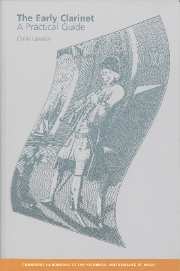5 - The language of musical style
Published online by Cambridge University Press: 22 September 2009
Summary
Introduction
Among all wind instruments, none approaches the tone of the full, female soprano voice as much as does the clarinet. Its richness of tone, which on the one hand approaches the powerful clarino, and on the other, the pleasant, gentle quality that can be played at a level hardly audible, as an echo, gives the clarinet the ability of projecting every kind of expression which the composer might wish to assign to it. In force and richness it reigns as a solo instrument in playing brilliant passages, to which its innate mellowness offers a beautiful contrast, while it is also able to adjust to any kind of character as an accompanying instrument. In the orchestra, it maintains a penetrating fullness and, at the same time, couples softness with it.
Fröhlich's enthusiasm for the clarinet dates from the era of Weber's concertos and is representative of the praise the instrument has inspired throughout its history. Yet an important caveat had already been issued by Lefèvre, who warned that clarinet playing could quickly become monotonous without appropriate nuance of sound and articulation. He stated that it was not sufficient merely to read the notes and play the music, for the clarinettist must identify its character and not be constrained by the notation. Lefèvre commented that a certain coldness and monotony had often been attributed to the instrument, which was in fact the responsibility of the player.
- Type
- Chapter
- Information
- The Early ClarinetA Practical Guide, pp. 63 - 74Publisher: Cambridge University PressPrint publication year: 2000



